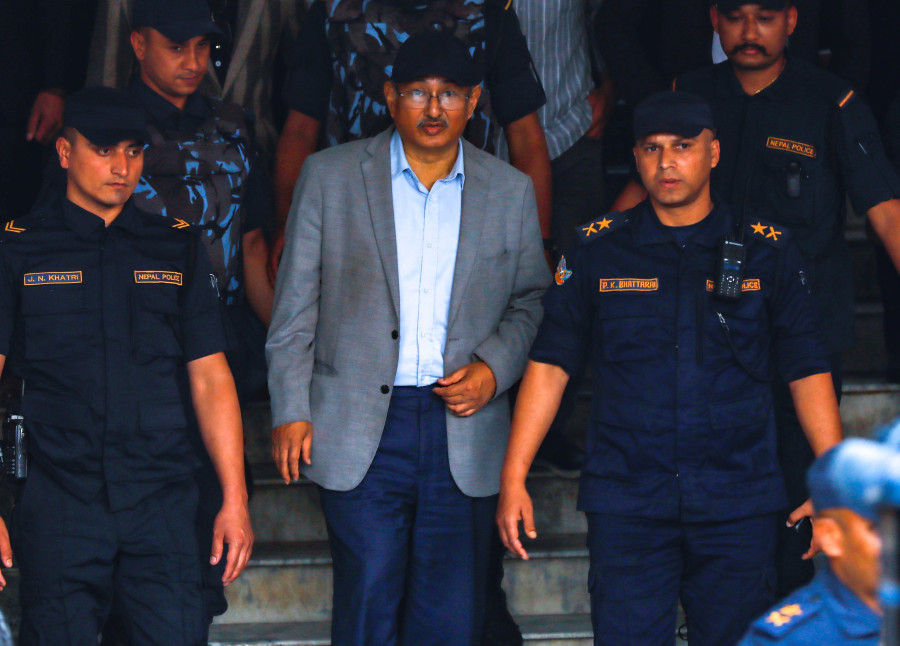Columns
No refuge, no shelter
Nepal will be confronted on the international arena for inviting the present imbroglio.
Semanta Dahal
The butterfly has flapped its wings at the Teku Police Range. A few highly positioned politicians and their apparatchiks have already been taken by the storm. The ripple now on the surface is not “if” but “when” the spread engulfs a few more bureaucratically and politically high-ranked people into the remit of the criminal investigation.
The criminal investigations underway should be allowed to proceed unhindered. Any political bonhomie which prevents the police from completing the investigations fairly and promptly must be foiled. But at the same time, police personnel involved in the investigation should also be reminded not to ignore the bedrock principles of criminal prosecution of innocence until proven guilty and protection of suspects’ privacy until alleged with a criminal charge.
State-sponsored fraud
The United Nations High Commissioner for Refugees (UNHCR) admits in its Resettlement Handbook that resettlement operations are vulnerable to fraud and malfeasance. Nepal has now become a textbook case of this UNHCR finding.
From the perspective of the larger public, the spate of incidents raises eyebrows because the verification and identification of the Bhutanese refugees reopened even after formal confirmation by the UNHCR of the closure of the third-country resettlement programme after the last batch for resettlement was considered in 2016. In the past, though, officials of the Home Ministry have argued that resettlement in third countries for remaining Bhutanese refugees can still be explored through bilateral efforts.
Nevertheless, the acts of forging the refugee database, deceiving people to fake their status by taking advantage of their situation, paying money to buy resettlement in a third country, and replacing the rightful place of bona fide Bhutanese refugees are all illegal. But here, the illegality is even more exacerbated due to the alleged support by the state actors to the fraudsters. Gradual uncovering of the alleged involvement of persons holding senior government positions–former home minister Bal Krishna Khand and former home secretary Tek Narayan Pandey–and senior advisors in a crisis watched by many countries and international agencies will discredit all the measures Nepal took to handle the plight of Bhutanese refugees.
Charges unlimited
One episode of criminality can give rise to several distinct counts of offences. Limited not only to the offence of cheating, this incidence of fraud, if corroborated with admissible shreds of evidence, can, under the National Penal Code, 2017, amongst others, attract the offence of forgery because of falsifying government documents (records), including improper use emblem of Nepal and conspiracy to carry out such a criminal act. What’s more, if the incident can arguably tarnish the international image of Nepal, a distinct felony of conduct inimical to national interest is another charge that may also be levelled.
Besides the National Penal Code, the offence of corruption under the Prevention of Corruption Act, 2002, and the offence of organised crime under the Prevention of Organised Crime Act, 2014 are other charges that perhaps are being considered by the investigating and prosecuting team. Corruption is defined to include the preparation of altered documents by public servants with criminal intent, and organised crime has facets of profiteering financially for a criminal enterprise by an organised conspiratorial group. In the fake refugee fiasco, the severity of the offence is even more aggravated due to public officials taking advantage of their office and commissioning the offence by five persons (or more) organised under a group.
Do not disturb
Prime Minister Pushpa Kamal Dahal, following his meeting with Nepali Congress president Sher Bahadur Deuba and CPN-UML chairperson KP Sharma Oli, said the leaders had arrived at a consensus not to “disturb” the police investigation. As the investigation proceeds, his statement will also be tested for veracity. A few factors become important in this regard. First, avoidance of publicity from government voices that can capture the media frenzy resulting in prejudice against the presumption of the innocence of the suspects. Second, removing any perceptions of a vindictive investigation by ensuring all suspects, especially high-ranked political actors, are investigated. Third, not derailing the investigation under any political compromise to remain in power. And most importantly, political shelter should not be provided to anybody suspected of this disgraceful crime.
State of disgrace
Although Nepal is non-signatory to the Convention Relating to the Status of Refugees, 1951 (Refugee Convention) and there remain valid arguments for Nepal not to join the UN-sponsored multilateral treaty, provisions incorporated under it significantly govern how states should cope and respond when faced with refugee problems. The preamble of the Refugee Convention emphasising the social and humanitarian nature of the refugee problem upholds the desire of the states to “do everything within their power to prevent [refugee] problem from becoming a cause of tension between [s]tates.” In simpler words, states should prevent the problem of refugees from becoming the cause of tension between them.
Nepal will be confronted on the international plane for inviting the present imbroglio. If it continues to mishandle the ongoing investigation and does not respect due process, it is inevitable for tension to arise–the tension for which Nepal will be the only country to receive the blame.




 11.12°C Kathmandu
11.12°C Kathmandu















